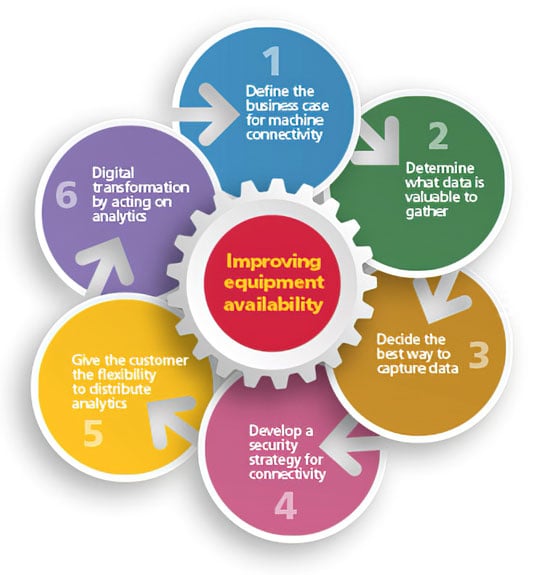Industry analysts have long predicted that process industry leaders would be disrupted by "digitally enabled competitors." To remain competitive, original equipment manufacturer (OEM) machine builders need to digitally transform themselves by embracing the Industrial Internet of Things (IIoT) and big data predictive analytics.
According to a survey conducted by the Aberdeen Group, "best-in-class" manufacturing companies are increasingly using IoT and big data to address and improve their top operational challenges, including:
- reducing unplanned downtime
- improving overall equipment effectiveness
- reducing maintenance costs
- increasing the return on assets
As the IIoT continues to evolve, there are more and more opportunities for machine builders to gain a competitive advantage to generate new revenue streams and improve their product development processes through the availability of real-time data. The vital focus is using this data to provide better service and support to the customer and improving equipment availability through remote monitoring and predictive maintenance models.
When innovative OEMs embed IIoT technology into machines, remote personnel can troubleshoot issues, change operating parameters, and oversee machine operation with supervisory control to avoid possible problems. OEMs can now advise on-site engineers and operators on how best to solve a problem or improve performance. This type of expertise combined with multi-tenant real-time visibility into daily operating conditions can extend the lifetime of machinery and process equipment.

To achieve these significant outcomes, organizations should follow these six steps when planning their connected machines implementation:
Define the business case for machine connectivity
Focus first on establishing clear business objectives for the way new data will be used to digitally transform the business. It is important to understand customers' key performance metrics to create a competitive advantage. Clearly defining these unique metrics significantly influences customers' ability to optimize operations while managing risk.
Determine what data is valuable to gather
Connected machines can generate large amounts of real-time data. Managing high volumes of machine data requires appropriate provisioning to accommodate secure network transport and storage. Therefore, it is important to determine what data is valuable to gather based on the business objectives. Begin by picking a specific business objective and let that determine the data that is captured.
Decide the best way to capture data
Depending on the machines and the connectivity standards, there may be multiple data protocols being used. An ideal connected machine solution should be flexible enough to access data from any industry protocol and scalable enough to interface with a broad variety of industry protocols and data sources.
Develop a security strategy for connectivity
Security is a key consideration for any IIoT deployment, and it is important to have a security strategy from the start. The first step is ensuring that the data being moved is the most critical to achieving business objectives. The next step is defining comprehensive security policies that determine how IoT-connected devices will communicate. Best-practice deployment safeguards may include the following: block all inbound wireless traffic to the gateway, lock all physical ports on gateways, partition your network of industrial machines for isolation from all other networks, and establish authentication/authorization access controls.
Give the customer the flexibility to distribute analytics
As the OEM, it is important to help customers establish an advanced analytics foundation based on their specific operations. Take action immediately by detecting and responding to local events at the edge as they happen. A distributed approach allows simultaneous integration of additional data sources in the cloud, enabling remote access to critical data.
Digital transformation by acting on analytics
Turn understanding into action by integrating connected machine data into the business and customer. Use newly available data insights to improve operator visibility and move from reactive or fixed-schedule maintenance models to predictive maintenance. Build contextually relevant user experiences for the people who know the machines best through web, mobile, and embedded applications that scale gracefully from smartphone to desktop.
Integrating IIoT technology into shop floor machines offers many advantages to the OEM and their customers.
A version of this article also was published at InTech magazine.




